Normal etiology sa node - Study guides, Class notes & Summaries
Looking for the best study guides, study notes and summaries about Normal etiology sa node? On this page you'll find 253 study documents about Normal etiology sa node.
Page 4 out of 253 results
Sort by
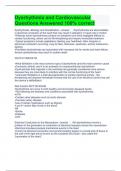
-
Dysrhythmia and Cardiovascular Questions Answered 100% correct
- Exam (elaborations) • 14 pages • 2023
- Available in package deal
-
- $23.99
- + learn more
Dysrhythmia and Cardiovascular Questions Answered 100% correct Dysrhythmias -Etiology and Classification •Dysrhythmias are abnormalities in electrical conduction of the heart that may result in alteration in heart rate or rhythm •Whereas some dysrhythmias produce no symptoms and have negligible effects on cardiac functioning, others can be life-threatening and require immediate treatment •Typical symptoms include palpitations (feeling your heartbeat: often irregular or abnormal contrac...
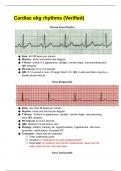
-
Cardiac ekg rhythms (Verified)
- Exam (elaborations) • 11 pages • 2024
-
- $10.50
- + learn more
Cardiac ekg rhythms (Verified) Normal Sinus Rhythm ● Rate: 60-100 beats per minute ● Rhythm: Atrial and Ventricular Regular ● P Wave: Uniform in appearance, upright, normal shape, one preceding each QRS complex ● PR Interval: 0.12- 0.2 seconds ● QRS: 0.12 second or less. (If larger than 0.12- QRS is wide and there may be a bundle branch block) Sinus Bradycardia ● Rate: Less than 60 beats per minute ● Rhythm: Atrial and Ventricular Regular ● P Waves: Uniform in appe...
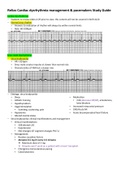
-
Relias Cardiac dysrhythmia management & pacemakers Study Guide.
- Other • 17 pages • 2023
- Available in package deal
-
- $10.99
- + learn more
Relias Cardiac dysrhythmia management & pacemakers Study Guide. Cardiac dysrhythmias − Students to review slides 4-29 prior to class: this content will not be covered in NUR 4120 − Normal sinus rhythm • Answers to evaluation of rhythm will always be within normal limits • Rate: 60-100bpm Sinus node dysrhythmias − Sinus bradycardia • HR < 60 bpm • Sinus node creates impulse at slower than normal rate • Characteristics of NSR but a slower rate − Etiology: sinus brad...
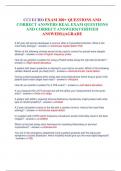
-
CCI ECHO EXAM 200+ QUESTIONS AND CORRECT ANSWERS REAL EXAM QUESTIONS AND CORRECT ANSWERS(VERIFIED ANSWERS)|AGRADE
- Exam (elaborations) • 20 pages • 2024
-
- $17.99
- + learn more
CCI ECHO EXAM 200+ QUESTIONS AND CORRECT ANSWERS REAL EXAM QUESTIONS AND CORRECT ANSWERS(VERIFIED ANSWERS)|AGRADE A 52 year old women developes a murmur after a myocardial infarction. What is the most likely etiology? - answer>>>Ventricular septal defect VSD Which of the following choices would not be used to correct for pulced wave doppler aliasing? - answer>>>Use of higher frequency probe How do you position a patient for using a Pedoff probe along the right ster...
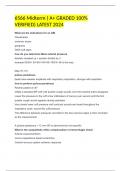
-
6566 Midterm ( A+ GRADED 100% VERIFIED) LATEST 2024
- Exam (elaborations) • 63 pages • 2024
-
- $8.79
- + learn more
6566 Midterm ( A+ GRADED 100% VERIFIED) LATEST 2024 What are the indications for an ABI Claudication ischemic ulcers gangrene GSW soft signs how do you determine Mean arterial pressure diastolic doubled up + systolic divided by 3 example 83/50= 50+50=100+83=183/3= 66 is the map Map 70-110 pulsus paradoxus beats have weaker amplitude with respiratory inspiration, stronger with expiration how to perform pulsus paradoxus Recline patient at 30° Inflate a standard BP cuff until qua...
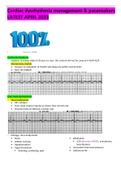
-
Cardiac dysrhythmia management & pacemakers
- Exam (elaborations) • 18 pages • 2023
-
- $8.99
- + learn more
Cardiac dysrhythmia management & pacemakers LATEST APRIL 2023 Cardiac dysrhythmias Students to review slides 4-29 prior to class: this content will not be covered in NUR 4120 Normal sinus rhythm • Answers to evaluation of rhythm will always be within normal limits • Rate: 60-100bpm Sinus node dysrhythmias Sinus bradycardia • HR < 60 bpm • Sinus node creates impulse at slower than normal rate • Characteristics of NSR but a slower rate Etiology...
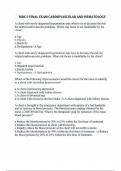
-
MDC 3 FINAL EXAM CARDIOVASCULAR AND HEMATOLOGY
- Exam (elaborations) • 38 pages • 2024
-
- $13.00
- + learn more
A client with newly diagnosed hypertension asks what to do to decrease the risk for related cardiovascular problems. Which risk factor is not modifiable by the client? a.Age b.Obesity c.Inactivity d.Dyslipidemia - a.Age A client with newly diagnosed hypertension asks how to decrease the risk for related cardiovascular problems. What risk factor is modifiable by the client? a.Age b.Impaired renal function c.Family history d.Dyslipidemia - d.Dyslipidemia Which of the following client ...
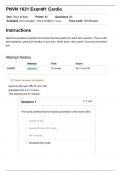
-
PNVN 1631 Exam#1 Cardio_ PNVN1631_ Medical - Surgical Nursing I {Score: 66.17 out of 80
- Exam (elaborations) • 59 pages • 2023
-
- $9.99
- + learn more
Ques 1 / 1 pts tion 1 The nurse clarifies that the master pacemaker of the heart is the: bundle of His. atrioventricular (AV) node. left ventricle. sinoatrial (SA) node. The SA node is the master pacemaker of the heart. Ques 1 / 1 pts tion 2 The patient has been hospitalized for hypertensive episodes three times in the last months. While preparing the discharge teaching plan, the nurse assesses that he does not comply with his medication regimen. The nurse’s immediate course of action ...
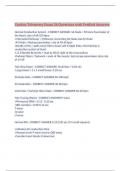
-
Cardiac Telemetry Exam 56 Questions with Verified Answers,100% CORRECT
- Exam (elaborations) • 8 pages • 2023
-
- $10.99
- + learn more
Cardiac Telemetry Exam 56 Questions with Verified Answers Normal Conduction System - CORRECT ANSWER -SA Node = Primary Pacemaker of the Heart, rate of 60-100 bpm -Internodal Pathways = Pathways connecting SA Node and AV Node -AV Node = Backup pacemaker, rate of 40-60 bpm -Bundle of His = splits nerve fibers down Left & Right Sides, His-Purkinje is conduction system of heart -L & R Bundle Brancehs = lead to left & right of the myocardium -Purkinje Fibers / Network = ends of the muscle, la...
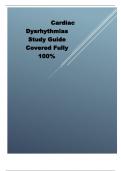
-
Cardiac Dysrhythmias Study Guide Covered Fully 100%:
- Exam (elaborations) • 13 pages • 2023
-
- $9.00
- + learn more
Cardiac Dysrhythmias Study Guide Covered Fully 100%: 1. Analyze the risk factors for cardiac dysrhythmias. 2. Differentiate the etiology, clinical manifestations, and nursing care for clients with normal cardiac rhythms, non-life threatening dysrhythmias, and life threatening dysrhythmias. 3. Evaluate rhythm strips and 12 lead ECGs for dysrhythmias, changes associated with acute coronary syndrome (ACS). 4. Prioritize nursing and collaborative care for clients with dysrhythmias and ECG change...

$6.50 for your textbook summary multiplied by 100 fellow students... Do the math: that's a lot of money! Don't be a thief of your own wallet and start uploading yours now. Discover all about earning on Stuvia


